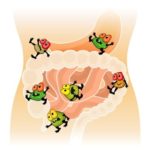A Gut Feeling

It’s hard to miss the adverts on television or in magazines for probiotic yoghurts that are full of good bacteria to keep our digestive systems healthy. But have you ever wondered what this actually means? We often think of bacteria as something that causes illness, but our bodies are full of it, good and bad. The important bit is to maintain the right balance, as the good bacteria are essential in fighting off the bad.
The right balance for you
Maintaining a balance of good bacteria (or probiotics) within the gut is essential for optimum wellbeing. A healthy gut means a healthy you as it improves digestion, strengthens the immune system, produces some important vitamins and helps to absorb minerals. Everyone’s ideal balance is individual depending on lifestyle and diet and this can develop over time. For example, the gut bacteria of someone on a high protein diet will vary to that of a vegetarian. There is no right or wrong as everyone is unique; just as we all look different, behave differently and have our own unique fingerprint. However, to remain healthy, the balance has to be right for you and this is affected by what you eat. Changing your gut bacteria can change your life!
Upsetting the balance
Aside from diet, there are a number of lifestyle factors that can upset the balance of good bacteria, including a treatment of antibiotics. The clue is in the name – probiotics means ‘for life’ and antibiotics means ‘against life’. Used correctly, antibiotics are an essential part of modern medicine, but it’s worth bearing in mind that a course will fight off the good bacteria as well as the bad and needs replenishing afterwards.
Spotting the signs of an imbalance
Here are some common signs to look out for:
- Digestive problems such as bloating, diarrhoea, constipation and IBS
- Joint pain
- Depression, anxiety and brain fog
- Hormonal issues
- Skin problems such as acne, rosacea, psoriasis and eczema
- Autoimmune diseases such as Hasimoto’s disease, rheumatoid arthritis and inflammatory bowel disease
Addressing the issue
As discussed in the February newsletter the digestive system is incredibly complex and vitally important to our overall health; you may be surprised at just how many symptoms are linked to digestive problems. When clients are suffering from exhaustion, any form of pain or hormonal issues, I always start by addressing their digestive system, specifically their gut, using the ‘Three R’ formula:
- Remove toxins and any foods that are causing an imbalance.
- Repair, which comes as a result of this.
- Re-inoculate to restore the balance of good bacteria.
Kath’s tips on maintaining a balance of good bacteria
- Avoid refined foods particularly grains and sugars.
- Eat plenty of fresh vegetables, fruit and high protein foods such as fresh meat, fish and pulses. The Paleo diet is a good one to follow.
- Take a probiotic supplement before bed which introduces good bacteria into the system. Make sure it is high quality and contains Lactobacillus and Bifidobacterium.I can help pinpoint the right one for you.
- Prebiotics act as a fertilizer for the good bacteria that already exists and are found in artichokes, cold potatoes and cold rice, (cook the potatoes or rice and then cool in the fridge, as this changes the structure making them harder to digest and therefore pass through to the large intestine to feed the good bacteria). Once cooled, the potatoes or rice can be reheated if desired.
- Gradually introduce fermented foods into your diet such as sauerkraut, fermented vegetables, live yoghurt and kefir (fermented milk).
- Finally, make sure you’re getting a good night’s sleep!
